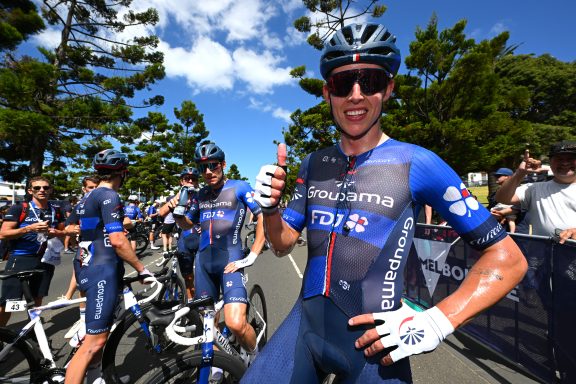Nearly two weeks after it started with the Tour Down Under, the Australian campaign came to an end on Sunday in Geelong, with the Cadel Evans Great Ocean Road Race. Coming as a defending champion, the Groupama-FDJ team couldn’t retain its title, but Rémy Rochas and Lewis Askey did fight at the front in the last ten kilometres. The Briton had to let go shortly before the finish, but the Frenchman managed to secure a top-10 position, in eighth, three seconds behind winner Mauro Schmid. A campaign both promising and frustrating.
About three weeks after landing on the other side of the globe, the Groupama-FDJ’s riders were set to end their stay “Down Under” this Sunday, with the Cadel Evans Great Ocean Road Race. A race won by Laurence Pithie in 2024, which then came as the first victory of the season. Jussi Veikkanen’s men knew exactly where they set foot, but a fundamental factor was to take into account on the Geelong circuit. “We knew it would be very, very hot, and it really was,” introduced the Finnish sports director. “In the car, I recorded 42 degrees as the highest temperature. That says a lot about the day’s conditions. It obviously made the race more difficult, and a lot of guys found themselves in trouble because of the heat.” “It was a race of attrition, and because of the heat, it was hard to recover from your efforts,” said Rémy Rochas. “I felt ok, not great, but I kept in mind that with the heat, the feelings can be a bit different. Looking at the faces of my colleagues in the peloton, I also told myself that I wasn’t doing so bad, especially when we had to do efforts in the climbs.”
“It’s frustrating for Lewis,” Jussi Veikkanen
While Andrea Raccagni Noviero was the only one willing to enter the day’s breakaway, the pack reached the climb of Challambra Crescent (1100m at 8.5%) seventy-three kilometres from the finish. Followed by another, 400-meter hill averaging 9.5%, this climb had to be repeated four times. “In the second lap already, it went very fast up the climb, but there were always downtimes between the climbs, so it would come back together,” explained Rémy. “We knew how the race was going to unfold,” added Jussi. “What we expected at the briefing was confirmed on the ground. The instructions were for Rémy and Quentin to follow on the last climb, and for Lewis to wait for the sprint.” Starting the last lap, around forty men still made up the peloton, which headed towards the final climbing sequence. “We found ourselves well positioned before Challambra Crescent with Lewis, it went really fast, and there were only a dozen of us left at the top,” added Rémy. The breakaway was caught, the day’s strongest broke away, but Mauro Schmid immediately took a gap on the descent. “I tried to get to the front of the group to maintain the speed as much as possible, as did I at the foot of the short hill, then Woods also came to pull”, added the French climber.
After the last climbs were covered, with five kilometres to go, Schmid was still in the lead, with about ten riders chasing, including the two riders of Groupama-FDJ. “In the final, I was chasing again, unfortunately Lewis was dropped at the back of the group”, said Rémy. “When I turned around, I saw that he was no longer there. Apparently, he warned me on the radio, but it wasn’t working”. “I’m really not good in the heat, so I’ve trained hard for it this year”, explained Lewis. “I know how well this course suited me, so I really wanted to still give it my best shot even though I knew the conditions were really not good for me. In the end, I just suddenly had a wave of sickness, my vision went blurry, and I was in a lot of pain. So for my health, I decided not to push anymore, and I think it was the right decision.” “He managed to get over the last two climbs, but he got so much into the red zone that he couldn’t recover,” Jussi said. “It’s a shame and frustrating for him, because it was a really great opportunity in a small group-finish.” Rémy Rochas kept his place in the chasing group but was unable to contest the win, which went to Mauro Schmid a few seconds ahead.
“It’s promising for the future”, Rémy Rochas
On the line, the climber took eighth place, in line with his nice performances on the Tour Down Under. “I spent a bit too much energy before the sprint,” he said. “I’m disappointed I couldn’t do a better result today, but we still had a great race. The guys did a great job, and the plan was perfectly executed. Lewis was also very strong, so it’s promising for the future. We will now learn from it and identify all the details we need to work on to try to get some victories.” “Everyone worked well this winter, everyone is physically ready, but now we need to find the right settings in racing,” concluded Jussi. “That’s what will help us progress and it’s the little difference we’re missing in the results. We certainly had better legs in this Australian campaign than the raw results suggest. It leaves us a bit hungry for more.”
